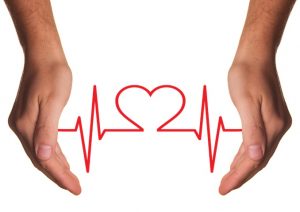Last week we discussed the impact your mind has on your workout, and it can’t be denied that a positive attitude can help you reach your fitness and weight loss goals. But there’s more to be said for the mind/body/spirit connection. When you’re in a positive place mentally and emotionally, you’re more likely to engage in a healthy lifestyle. What if we told you that getting to that sweet spot was as easy as regularly performing random acts of kindness?
 It might sound like a New Age idiom, but there’s actually scientific proof that being kind has mental and emotional benefits. When you do something kind, the very act releases dopamine into your system. That’s the “happy hormone” you hear so much about that makes you feel good and it’s a motivator, so that’s a plus when it comes to getting your mind on board with working out. Being kind also causes your brain to produce serotonin, which alleviates depression and produces feelings of wellbeing and satisfaction. Additionally, serotonin reduces anxiety and both dopamine and serotonin help reduce stress. However, there’s more to it than that: although being kind can help you get in the right mindset to start and stick with a workout plan, it affects your physical health in a more direct way, as well.
It might sound like a New Age idiom, but there’s actually scientific proof that being kind has mental and emotional benefits. When you do something kind, the very act releases dopamine into your system. That’s the “happy hormone” you hear so much about that makes you feel good and it’s a motivator, so that’s a plus when it comes to getting your mind on board with working out. Being kind also causes your brain to produce serotonin, which alleviates depression and produces feelings of wellbeing and satisfaction. Additionally, serotonin reduces anxiety and both dopamine and serotonin help reduce stress. However, there’s more to it than that: although being kind can help you get in the right mindset to start and stick with a workout plan, it affects your physical health in a more direct way, as well.
Compassion Aids Digestion
It turns out kindness is a solution for tummy trouble. The dopamine and serotonin that performing an altruistic act produces assists in the digestion process. Dopamine protects your stomach lining, a useful element for preventing peptic ulcers. What’s more, both serotonin and dopamine get your intestines working to move food through your gastrointestinal tract. In fact, medications containing serotonin are given to chemotherapy patients to treat vomiting and nausea. Plus, studies have found that those same meds are also effective for irritable bowel syndrome and other gastrointestinal issues.
A Charitable Heart is a Healthy Heart
 You know that warm, fuzzy feeling you get from doing something nice for someone? That’s the physical feeling of your brain producing oxytocin and flooding your body with it. The feeling is a nice enough side-effect, but that hormone also feeds nitric oxide into your system. Also known as “NO,” nitric oxide offers a host of health benefits including enhanced weight loss. It’s also important for heart health, too. NO dilates blood vessels which improves blood flow for lower blood pressure.
You know that warm, fuzzy feeling you get from doing something nice for someone? That’s the physical feeling of your brain producing oxytocin and flooding your body with it. The feeling is a nice enough side-effect, but that hormone also feeds nitric oxide into your system. Also known as “NO,” nitric oxide offers a host of health benefits including enhanced weight loss. It’s also important for heart health, too. NO dilates blood vessels which improves blood flow for lower blood pressure.
A Cure for the Common Cold

Kind acts boost your immune system to ward off illness, but being on the receiving end of kindness can help you heal faster, too.
When it comes to treating illness, kindness works two ways. First, boosting that NO we just talked about through kind acts also boosts your immune system and helps your body fight infection. However, being on the receiving end of kindness can help you recover from an illness quicker. A 2011 study showed that when care providers showed greater empathy to patients, those patients’ common cold symptoms were less severe, and the duration of the illness was decreased. That says a lot for giving and receiving kindness, and it should give you a whole new take on being good to yourself when you’re under the weather.
Empathy is an Anti-Inflammatory
 In a way, kindness is Nature’s aspirin, acting as an anti-inflammatory to alleviate chronic pain, migraines, and help with other issues associated with inflammation such as cancer, diabetes, and obesity. It’s that amazing oxytocin at work once again, and research has proven it. In a 2013 study, researchers found that out of an assortment of typical activities such as working, managing a household, and volunteering, the volunteering affected inflammation the most, producing the lowest levels across the board. Sure, you can sign up at a soup kitchen or commit to coaching a kids soccer team, but every little act is effective, even paying for the order of the person behind you in line at the coffee shop or giving the last grocery cart to another shopper can offer anti-inflammatory benefits, as well.
In a way, kindness is Nature’s aspirin, acting as an anti-inflammatory to alleviate chronic pain, migraines, and help with other issues associated with inflammation such as cancer, diabetes, and obesity. It’s that amazing oxytocin at work once again, and research has proven it. In a 2013 study, researchers found that out of an assortment of typical activities such as working, managing a household, and volunteering, the volunteering affected inflammation the most, producing the lowest levels across the board. Sure, you can sign up at a soup kitchen or commit to coaching a kids soccer team, but every little act is effective, even paying for the order of the person behind you in line at the coffee shop or giving the last grocery cart to another shopper can offer anti-inflammatory benefits, as well.
Is Kindness the Key to Aging?
Inflammation not only contributes to a range of health problems, but it ages you, too. On top of that, free radicals assault your cells, speeding up the process. However, adding kind acts to your daily life actually reduces both aging causes. Research has revealed that the oxytocin produced when you get the warm fuzzies from doing something nice slows the corrosive effects of inflammation and free radicals. Plus, studies suggest the link between compassion and the vagus nerve, which helps manage inflammation and regulates the heart, also plays a part in slowing the aging process.
Make Time for Kindness
 If being kind can improve your physical and mental health and enhance your exercise goals, it’s certainly worth making time for. It starts with recognizing opportunities for action, like helping a stranger loaded with shopping bags or stacking firewood for your neighbor. If it’s not part of your routine, you probably miss a thousand chances every day to do the nice thing. Just like any habit, it will take time to firmly embed it in your life, but there are things you can do to help kindness take hold quicker.
If being kind can improve your physical and mental health and enhance your exercise goals, it’s certainly worth making time for. It starts with recognizing opportunities for action, like helping a stranger loaded with shopping bags or stacking firewood for your neighbor. If it’s not part of your routine, you probably miss a thousand chances every day to do the nice thing. Just like any habit, it will take time to firmly embed it in your life, but there are things you can do to help kindness take hold quicker.
Print out little reminders like the ones in this article and tape them to your mirror and other various places like your car and your office. Use one as a bookmark. Or write kindness quotes in your journal or day planner. You can even find calendars and planners dedicated to keeping kindness in the front of your mind, like the free planner you can get here. And when you’re making time for kindness, be sure to schedule yourself in for a generous dose. When you know what it’s like to receive, you can give all the more whole-heartedly.



Great content, congratulations. I will visit often.
I found your article very good. Congratulations for this beautiful article. I intend to follow you constantly. I wish you continued success.
I’m trying hard to have a positive attitude but this alone is so hard these days
Wow! After all I got a website from where I be
capable of really obtain valuable data regarding my study and
knowledge.
This is my first time visit at here and i am actually impressed to read all at single
place.
Thanks for finally talking about > A Little Kindness Goes a
Long Way – Targitfit Blog < Liked it!
Wonderful post! We are linking to this great article on our site.
Keep up the good writing.